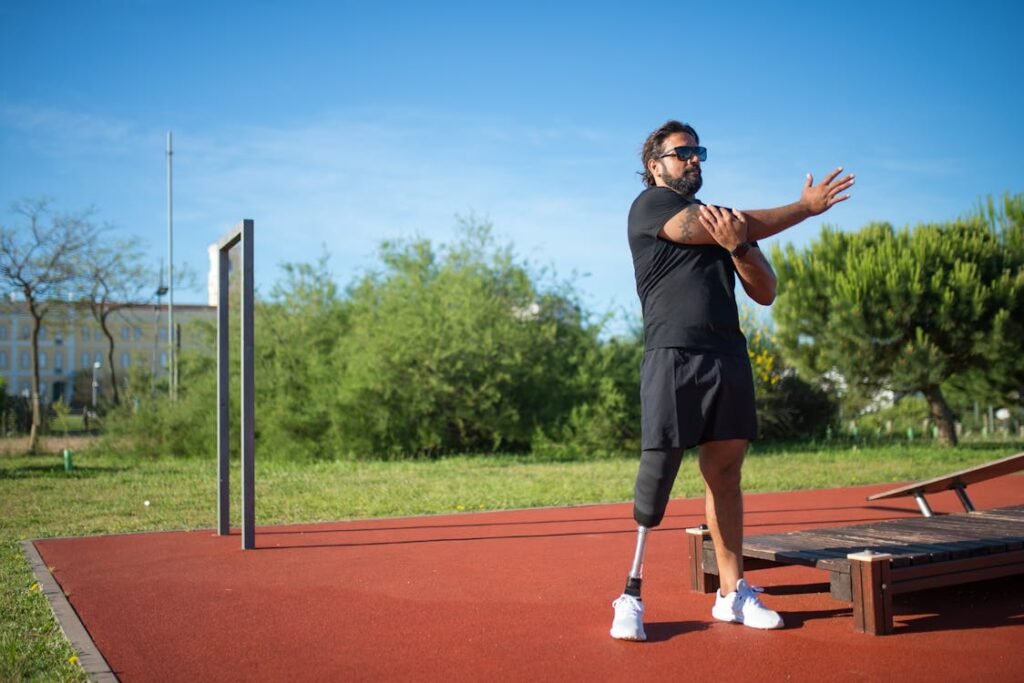Losing a limb changes life in ways that many people cannot imagine. Simple activities like walking, holding objects, or even getting dressed become challenges. But beyond the physical struggles, the emotional impact can be even greater. Many amputees face a loss of confidence, independence, and even a sense of identity.
However, there is a powerful way to regain confidence, strength, and self-belief—adaptive sports. These specially designed sports help amputees push their limits, rediscover their abilities, and build a new, empowered version of themselves. Whether it’s running, swimming, cycling, or even rock climbing, adaptive sports prove that life after amputation can still be active, fulfilling, and full of excitement.
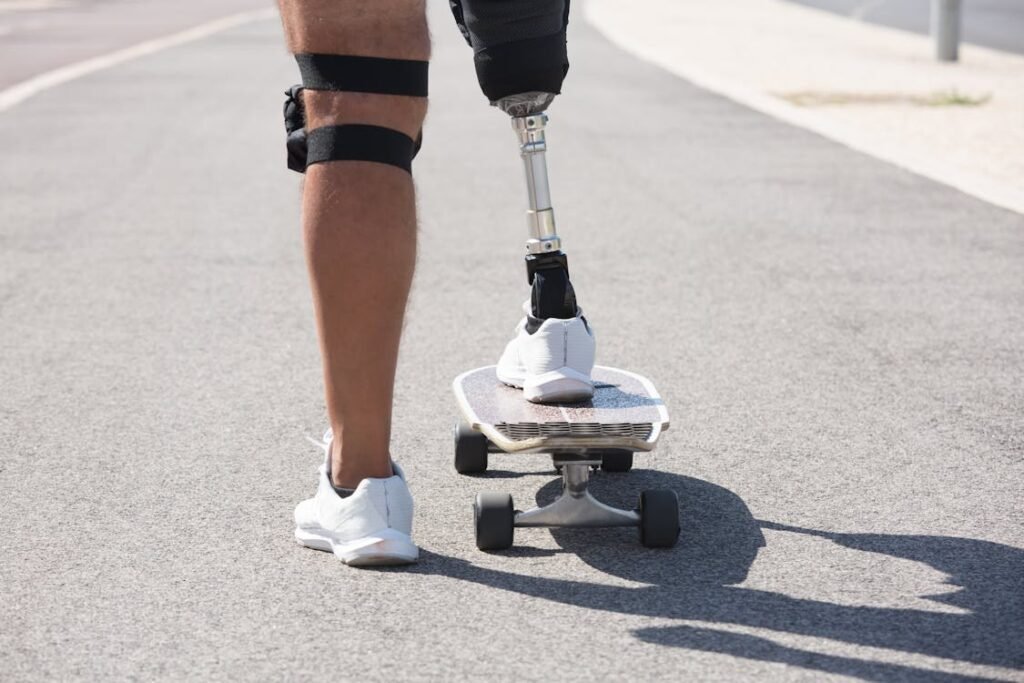
The Power of Adaptive Sports in Restoring Confidence
Sports have always been a way for people to challenge themselves, stay healthy, and connect with others. For amputees, adaptive sports offer something even deeper—a way to reclaim control over their bodies and lives.
The journey after amputation is filled with uncertainty, but engaging in sports can break down those barriers, replacing doubt with strength and fear with determination.
Overcoming Physical Barriers
One of the biggest challenges amputees face is adapting to a new way of moving. The body needs time to adjust to changes, and muscles that were once strong may weaken due to inactivity. Adaptive sports provide a structured way to rebuild strength, endurance, and flexibility.
A person who once thought they could never run again may discover that, with the right prosthetic limb and training, they can sprint faster than they ever imagined.
Someone who struggled with balance may find that swimming helps them regain coordination. Each movement, no matter how small, is a step toward greater physical freedom.
Modern prosthetic technology has also made sports more accessible than ever. Advanced bionic limbs like Grippy™ from Robobionics are designed to offer better grip, control, and responsiveness.
This allows amputees to participate in a wide range of activities, from lifting weights to playing badminton. With the right prosthetic and training, no sport is off-limits.
Breaking Mental Barriers
Physical challenges are just one part of the journey. The mental battle can often be more difficult. Many amputees experience feelings of helplessness, anxiety, or depression after limb loss.
The idea of engaging in sports may seem overwhelming at first, especially when surrounded by able-bodied athletes.
However, adaptive sports create an environment where amputees can focus on what they can do rather than what they have lost.
The moment an amputee crosses a finish line, makes a basket, or completes a lap in the pool, their mindset begins to shift. Instead of seeing themselves as limited, they start to see themselves as capable.
Each achievement, no matter how small, rewires the brain to believe in possibility rather than limitation.
Confidence grows when individuals prove to themselves that they are strong. Adaptive sports give amputees the chance to see their own progress, set goals, and achieve them.
Whether it’s improving reaction time with a prosthetic hand or developing stronger legs for running, every milestone builds self-belief.
The Social Connection
One of the most overlooked benefits of adaptive sports is the community it builds. Losing a limb can often feel isolating, and many amputees struggle with feeling different or out of place.
But in an adaptive sports environment, everyone is facing similar challenges, creating a space of mutual understanding and encouragement.
Training alongside others who have experienced limb loss fosters friendships and a sense of belonging. It’s easier to push through struggles when surrounded by people who truly understand the journey.
Sharing experiences, offering support, and celebrating victories together creates a strong network of motivation.
Sports teams and events also provide opportunities to educate others. When amputees compete in public events, they challenge stereotypes and prove that disability does not mean inability.
Spectators, friends, and even other athletes witness firsthand what determination looks like. This can lead to greater inclusivity, awareness, and respect for people with limb differences.
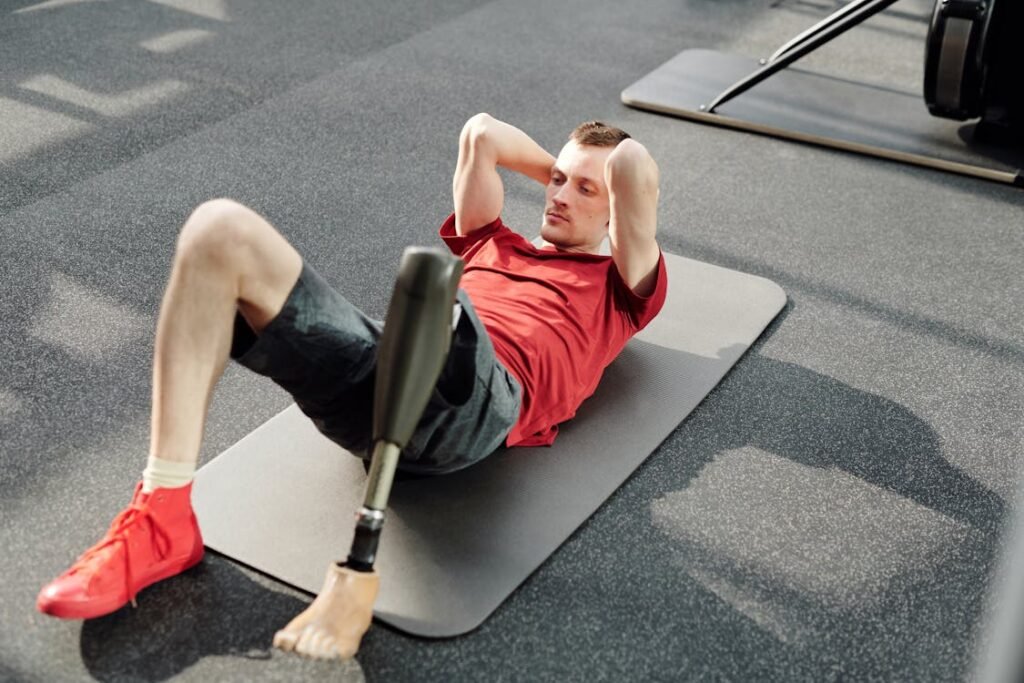
How Adaptive Sports Transform Daily Life
Participating in adaptive sports does not just build strength and confidence on the field—it carries over into every part of life. The discipline, resilience, and problem-solving skills gained through sports help amputees regain control over their daily activities.
Simple things that once felt impossible, like carrying groceries, climbing stairs, or driving, become easier when the body is trained to move efficiently and the mind is conditioned to overcome challenges.
Regaining Independence Through Movement
One of the biggest struggles amputees face is dependence on others. Losing a limb often means relearning basic tasks, and this can be frustrating.
Many people fear that they will never be able to do things on their own again. Adaptive sports provide a structured way to rebuild physical strength and coordination, which in turn helps with everyday activities.
A person who takes up cycling, for example, develops stronger leg muscles and balance, which helps with walking and standing for long periods.
Someone who swims regularly improves their overall endurance, making it easier to move around throughout the day.
Rock climbers, wheelchair racers, and basketball players all develop specific muscle groups that make daily tasks feel less exhausting. The stronger and more agile the body becomes, the less help is needed in everyday life.
Overcoming Fear and Self-Doubt
For many amputees, stepping outside the house can be a challenge. The fear of being stared at, judged, or pitied can be overwhelming. Engaging in adaptive sports forces individuals to step out of their comfort zones and face these fears head-on.
The first few training sessions may feel intimidating, but over time, confidence grows. As amputees learn to navigate physical challenges, they also develop the mental strength to handle social situations.
Sports help shift the focus from what others think to what the individual is capable of achieving.
Achieving small victories in sports—whether it’s running a little faster, lifting more weight, or scoring a goal—builds self-esteem. Every success reinforces the idea that life after amputation is not about limitations but possibilities.
This newfound confidence makes social interactions, job interviews, and even casual outings feel less daunting.
Emotional Healing and Stress Relief
Adaptive sports offer more than just physical benefits; they also provide a powerful emotional outlet. Losing a limb is an emotional journey filled with grief, frustration, and sometimes anger.
Exercise and sports help release pent-up emotions in a healthy way, reducing stress and anxiety.
Physical activity triggers the release of endorphins, the body’s natural mood boosters. These chemicals help reduce stress, improve sleep, and promote a sense of well-being.
Many amputees who engage in adaptive sports report feeling more positive and motivated, even when facing life’s challenges.
Team sports, in particular, offer a strong support system. Playing alongside others who have experienced similar struggles creates deep bonds and friendships.
Being part of a team fosters a sense of belonging, which is crucial for emotional healing. Knowing that others are facing similar challenges—and overcoming them—provides inspiration and motivation.
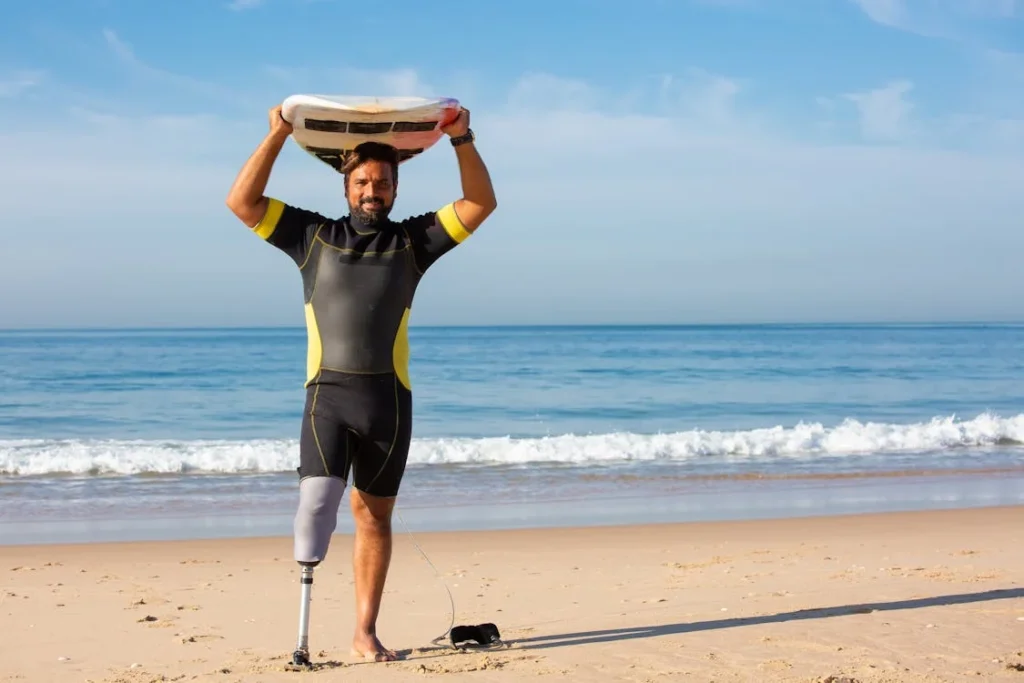
The Role of Technology in Making Adaptive Sports More Accessible
The evolution of prosthetic technology has completely changed what is possible for amputees in sports. Years ago, losing a limb meant giving up certain physical activities, but today, advanced prosthetics allow individuals to run, swim, cycle, and even lift weights with ease.
These innovations are not just about movement; they are about empowerment. They give amputees the ability to train, compete, and push their limits just like any other athlete.
Advanced Prosthetics: A Game Changer
Prosthetics have come a long way from simple, functional designs to highly specialized devices that enhance athletic performance. The introduction of lightweight, ergonomic prosthetic limbs has made movement more natural and efficient.
Devices like Grippy™ from Robobionics offer improved grip strength, flexibility, and responsiveness, allowing users to engage in a wide range of sports without restrictions.
Running blades, for example, are designed to provide the bounce and energy return needed for sprinting. They are built with carbon fiber, making them strong yet lightweight.
These blades mimic the movement of a human foot, helping amputees run with speed and agility. Similarly, specialized prosthetic arms allow individuals to grip a tennis racket, throw a basketball, or even lift weights with precision.
Waterproof prosthetics have opened up opportunities in swimming, surfing, and other water sports. Traditional prosthetic limbs were often too heavy or fragile for water activities, but modern designs allow users to move effortlessly in aquatic environments.
This has given amputees the freedom to explore sports that were once considered impossible.
Training and Rehabilitation for Peak Performance
Getting started in adaptive sports requires training, and rehabilitation plays a big role in preparing the body.
Many amputees begin with physical therapy to strengthen muscles, improve balance, and get comfortable using their prosthetic limbs. This phase is crucial for building the foundation needed to excel in sports.
At Robobionics, we understand that the transition to sports can be challenging, which is why we emphasize gamified rehabilitation programs.
These programs make training more engaging by turning exercises into interactive experiences. Virtual reality-based exercises, resistance training, and motion tracking help users improve their skills in a fun and effective way.
A key part of training is learning how to control the prosthetic limb efficiently. It takes time for the brain and body to sync movements, but with practice, athletes gain better control.
Many adaptive sports programs include specialized coaching to help amputees develop the right techniques for their chosen sport. Whether it’s perfecting a running stride or improving grip strength for rock climbing, training ensures that individuals can perform at their best.
Making Adaptive Sports More Inclusive
Despite advancements in prosthetics, access to adaptive sports remains a challenge for many. Lack of awareness, limited facilities, and high costs can make it difficult for amputees to get involved.
However, organizations and companies like Robobionics are working to change this by promoting affordable, locally manufactured prosthetics and partnering with rehabilitation centers to make training more accessible.
Many communities now offer adaptive sports programs, and international events like the Paralympics have helped increase awareness.
Schools, sports clubs, and fitness centers are also becoming more inclusive, providing opportunities for people with limb differences to participate in physical activities. The goal is to ensure that no one feels excluded due to their disability.
By creating more opportunities and making technology accessible, we can empower more amputees to take charge of their health and confidence through sports.
The journey begins with a single step, and with the right prosthetic, training, and support, that step can lead to incredible achievements.
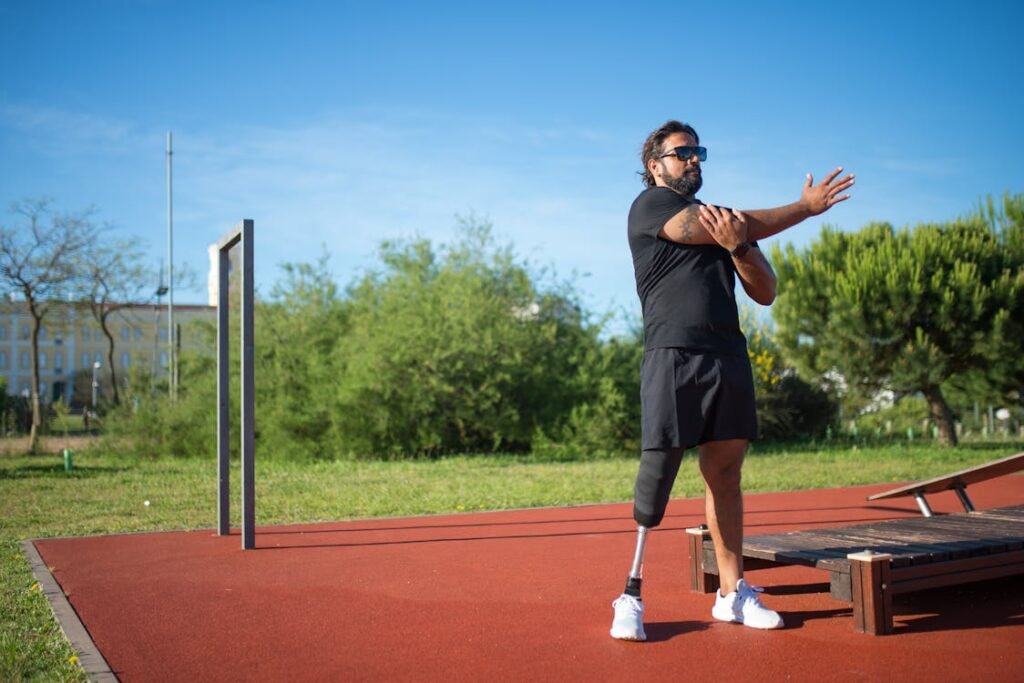
Inspiring Stories of Amputees Who Found Strength Through Adaptive Sports
Real stories of resilience and determination prove that limb loss is not the end of an active life. Around the world, amputees have embraced adaptive sports to transform their lives, proving that strength comes from within.
These individuals serve as a source of inspiration for anyone facing similar challenges, showing that with the right mindset, anything is possible.
Overcoming the Odds to Become Champions
Many amputees start their journey in adaptive sports with doubt and hesitation, but as they train and push themselves, they discover their true potential. Take the story of Deepa Malik, who became the first Indian woman to win a medal in the Paralympics.
Despite being paralyzed from the waist down, she took up shot put and javelin throw, proving that physical limitations do not define a person’s abilities. Her success has inspired countless people with disabilities to believe in their own strength.
Another incredible example is Terry Fox, a Canadian athlete who lost his leg to cancer but didn’t let it stop him from pursuing greatness.
He ran across Canada with a prosthetic leg, raising millions for cancer research and proving that determination can overcome any obstacle. His story continues to inspire amputees worldwide to challenge themselves and never give up.
Closer to home, countless individuals are breaking barriers in local adaptive sports programs. With the rise of advanced prosthetic solutions like Grippy™ from Robobionics, more people are stepping onto the field, track, and swimming pool with renewed confidence.
Small Steps, Big Impact
Not every amputee who participates in adaptive sports dreams of competing at an international level. For many, the goal is simply to regain control over their own body and life.
A person who once struggled with walking may now be able to run with ease. Someone who feared social gatherings may find confidence through sports teams and group activities.
These small victories create a ripple effect, improving not just physical health but also mental well-being.
Participating in sports leads to increased independence. When an amputee learns to cycle, swim, or play basketball, they develop better control over their movements.
These skills translate into everyday tasks—walking with stability, carrying objects confidently, or even driving independently. What starts as a recreational activity becomes a life-changing journey toward self-sufficiency.
The Power of Representation
When people see amputees actively participating in sports, it shifts societal perceptions. Instead of viewing limb loss as a weakness, it becomes a testament to resilience. The more visible amputee athletes become, the more inclusive sports communities will be.
This is why promoting adaptive sports is so important. Whether it’s through school programs, community events, or national competitions, every opportunity to showcase the strength of amputees helps break stereotypes and encourage inclusivity.
Companies like Robobionics are at the forefront of this movement, ensuring that affordable, high-quality prosthetics are available to support these athletes.
The message is clear: limb loss does not mean life stops. Through adaptive sports, amputees reclaim their identity, confidence, and sense of purpose. They prove to themselves and the world that they are not defined by what they have lost, but by what they continue to achieve.
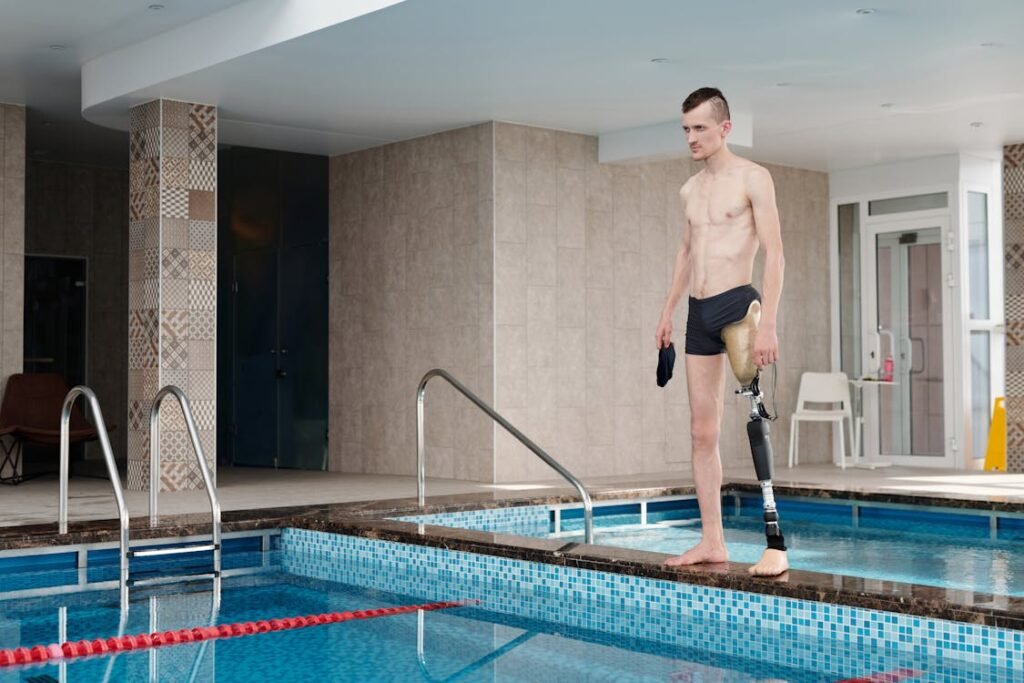
How to Get Started with Adaptive Sports
For many amputees, the idea of participating in sports can feel overwhelming at first. Questions like “Will I be able to do this?” or “What if I fail?” often hold people back.
But the truth is, every great athlete starts somewhere. The key is to take the first step, no matter how small. With the right support, equipment, and mindset, adaptive sports can become a life-changing journey.
Finding the Right Sport
The first step is to explore different options and find a sport that matches personal interests and abilities.
Some amputees may prefer high-energy activities like running or basketball, while others may enjoy water-based sports like swimming or rowing. The choice depends on comfort, physical condition, and passion.
Many organizations offer trial sessions where amputees can try various sports before committing to one. This helps in understanding what feels natural and enjoyable.
For example, someone with a below-knee amputation may find that cycling is easier than running, while an upper-limb amputee might discover a talent for archery or table tennis. The goal is to find something that feels rewarding, not forced.
Getting the Right Prosthetic and Gear
The next step is ensuring that the right prosthetic equipment is in place. Standard prosthetics work well for daily activities, but sports often require specialized limbs.
Running blades, waterproof prosthetics, and high-grip bionic hands, like Grippy™ from Robobionics, are designed to handle the demands of different activities.
A consultation with a prosthetist can help determine what kind of limb will work best for a particular sport. Many adaptive sports programs also have loaner equipment, allowing beginners to try different options before making a long-term investment.
Proper footwear, protective gear, and comfortable clothing also play an important role in preventing injuries and ensuring smooth movement.
Building Strength and Conditioning
Before jumping into a sport, it’s important to prepare the body. This includes working on balance, coordination, and overall fitness.
Strengthening exercises focused on the core, legs, or arms (depending on the amputation type) can help build the endurance needed to perform well.
Physical therapy is often a good starting point, as therapists can recommend specific exercises to improve movement and posture.
Gamified rehabilitation programs, like those offered by Robobionics, make this process engaging and interactive, helping users strengthen their muscles while having fun.
Finding a Supportive Community
Getting involved in adaptive sports is easier when there’s a strong support system. Many cities have local clubs, rehabilitation centers, and organizations that cater specifically to amputee athletes.
Joining these groups provides access to experienced coaches, teammates, and mentors who understand the journey firsthand.
Training with other amputees creates an environment of encouragement and motivation. Seeing others succeed fosters a belief that anything is possible.
Whether through friendly competition or shared experiences, being part of a community makes the process more enjoyable and rewarding.
Embracing the Journey
Starting any new sport comes with challenges, and adaptive sports are no different. There will be moments of frustration, but there will also be incredible breakthroughs.
Every milestone—whether it’s running a little farther, lifting heavier weights, or simply feeling more comfortable in motion—is a step toward regaining confidence.
The key is to focus on progress rather than perfection. The first time an amputee rides a bike, swims a lap, or completes a race will always be a powerful reminder of their strength.
Through persistence, training, and the right mindset, adaptive sports can open doors to a life filled with movement, confidence, and independence.
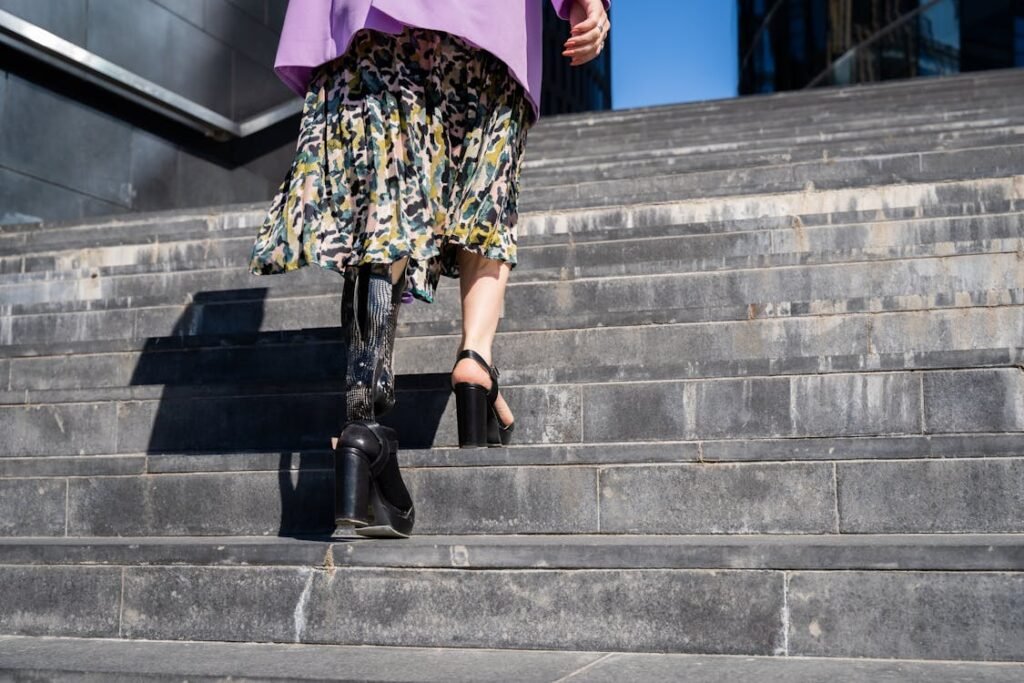
The Road Ahead: A Life of Strength and Confidence
Adaptive sports are more than just physical activities—they are a pathway to a stronger, more confident life. For amputees, stepping onto the field, into the water, or onto the track is about much more than competition.
It’s about proving to themselves that they are capable, resilient, and unstoppable. The journey may start with hesitation, but it leads to a place of empowerment where self-doubt fades and confidence takes over.
A New Perspective on Life
Many amputees who start adaptive sports find that their entire outlook on life changes. Instead of focusing on what they’ve lost, they begin to see what they can achieve.
They become more independent, physically strong, and mentally tough. The discipline learned through sports often spills into other areas of life—whether it’s pursuing new career goals, traveling, or simply enjoying everyday activities without fear.
The benefits extend beyond the individual. When amputees engage in sports, they inspire others—whether it’s fellow amputees, family members, or even complete strangers.
Their achievements help break down barriers and change perceptions about disability. They prove that strength is not about having all the physical parts of a body—it’s about having the will to keep moving forward.
Continuing the Journey with the Right Support
The road to confidence and independence doesn’t stop with sports—it continues with ongoing support, training, and access to advanced prosthetic technology.
Companies like Robobionics are committed to making sure amputees have the tools they need to live active, fulfilling lives. With innovative prosthetic solutions like Grippy™, athletes can perform at their best without limitations.
For those just beginning their journey, the key is to take the first step. Whether it’s trying a sport for the first time, connecting with an adaptive sports club, or investing in a high-performance prosthetic, every action leads closer to a life of movement and confidence.
The Message Is Clear: You Are Unstoppable
Amputees who embrace adaptive sports prove that life after limb loss is not about limitations—it’s about possibilities. Whether it’s running, swimming, cycling, or lifting weights, every movement is a statement of strength.
The road ahead is filled with opportunities, and with the right mindset, technology, and community, anything is possible.
So, take that first step. Try something new. Challenge yourself. Because the journey to regaining confidence starts with believing that you are capable of greatness. And the truth is—you absolutely are.
Conclusion
Adaptive sports offer amputees a powerful way to rebuild confidence, strength, and independence. Beyond the physical benefits, they help individuals break mental barriers, regain control over their lives, and rediscover their potential. Every step, stroke, or push forward is a testament to resilience, proving that limb loss does not define one’s abilities.
With the right mindset, training, and technology—like Grippy™ from Robobionics—amputees can participate in sports without limitations. The journey may start with uncertainty, but it leads to a life filled with movement, empowerment, and possibility.
For those considering adaptive sports, the most important step is the first one. Whether it’s joining a local team, trying a new activity, or investing in the right prosthetic, every effort brings new opportunities. Confidence is built through action, and the message is clear—you are strong, capable, and unstoppable.
Are you ready to start your journey? Book a free demo with Robobionics today and take the first step toward a more active and independent life!



